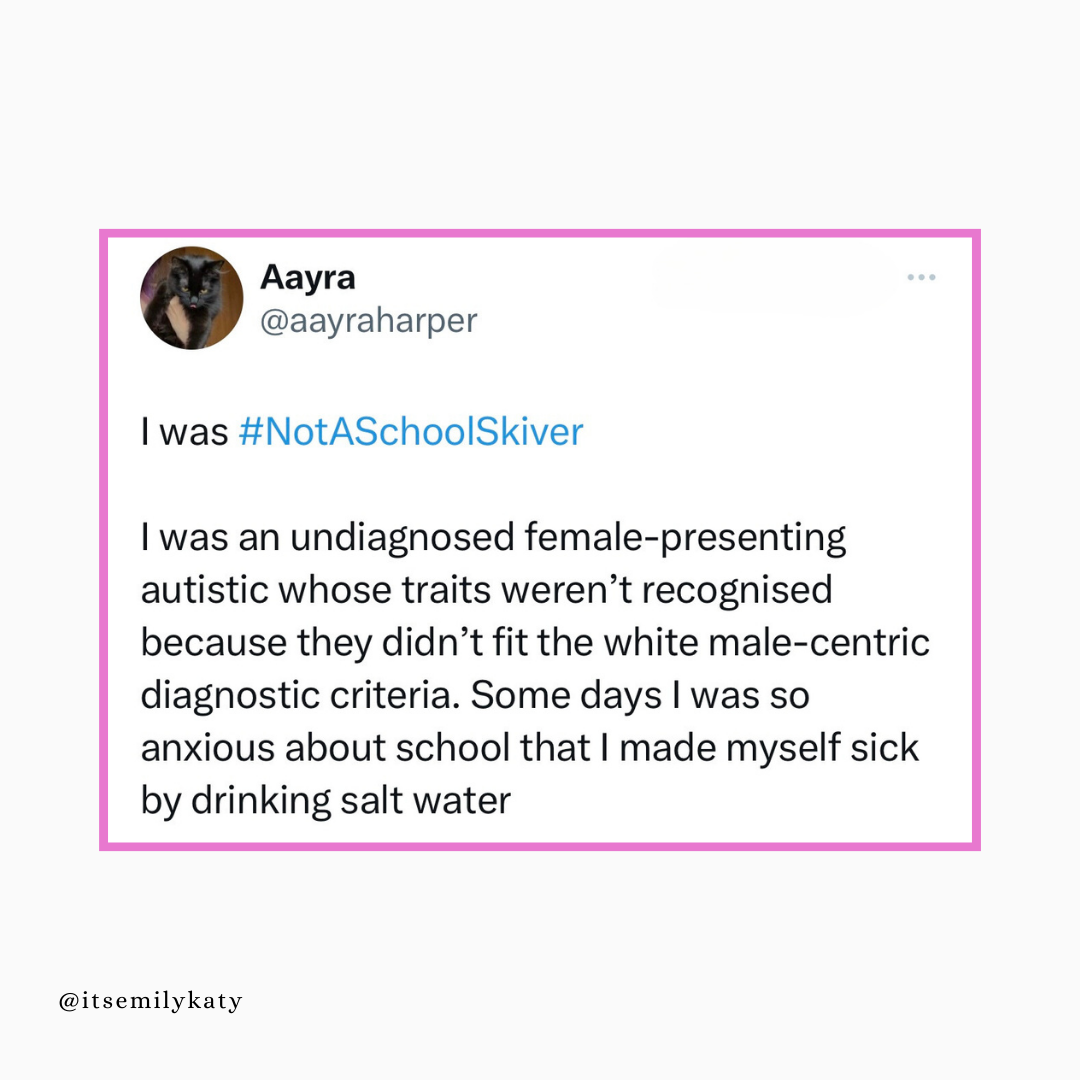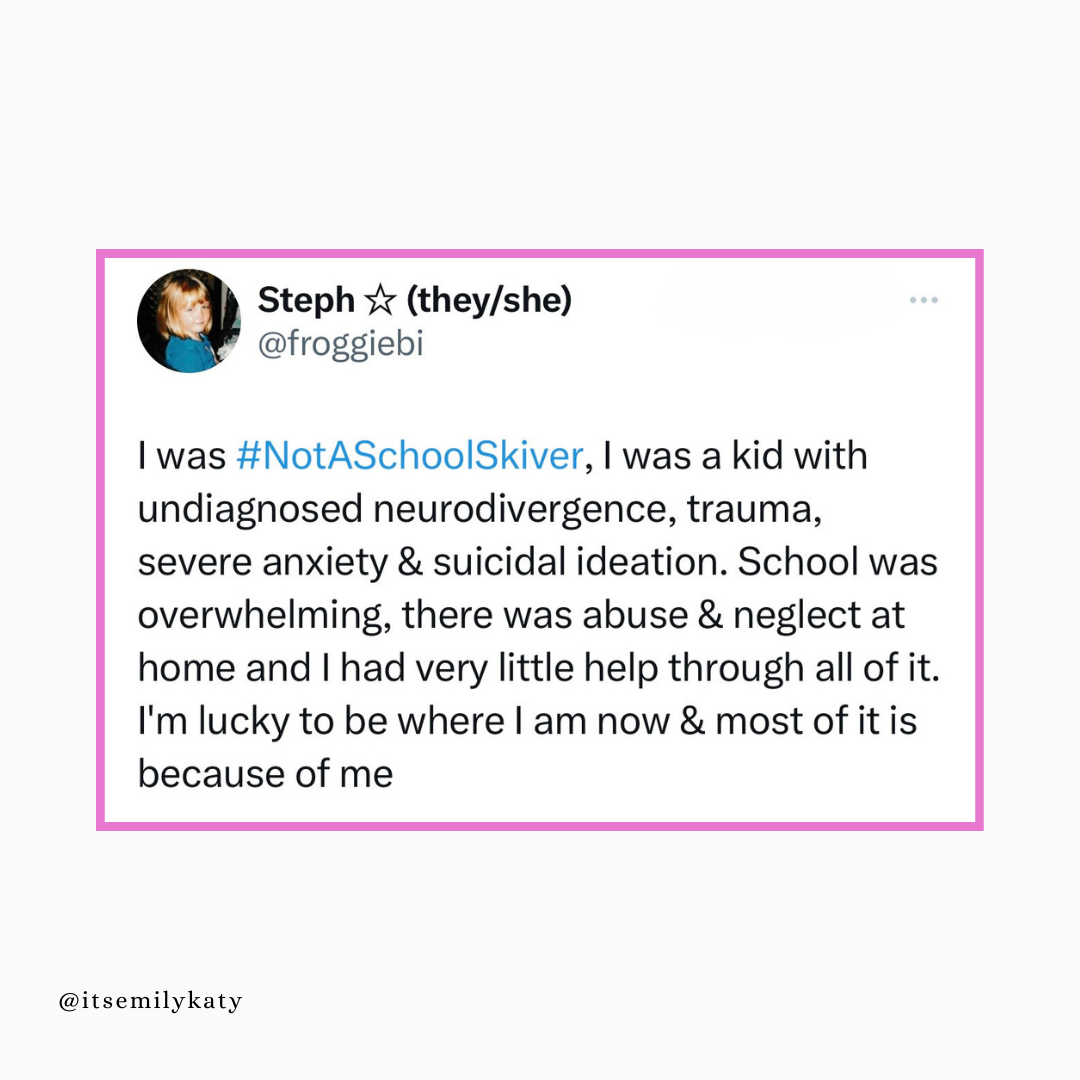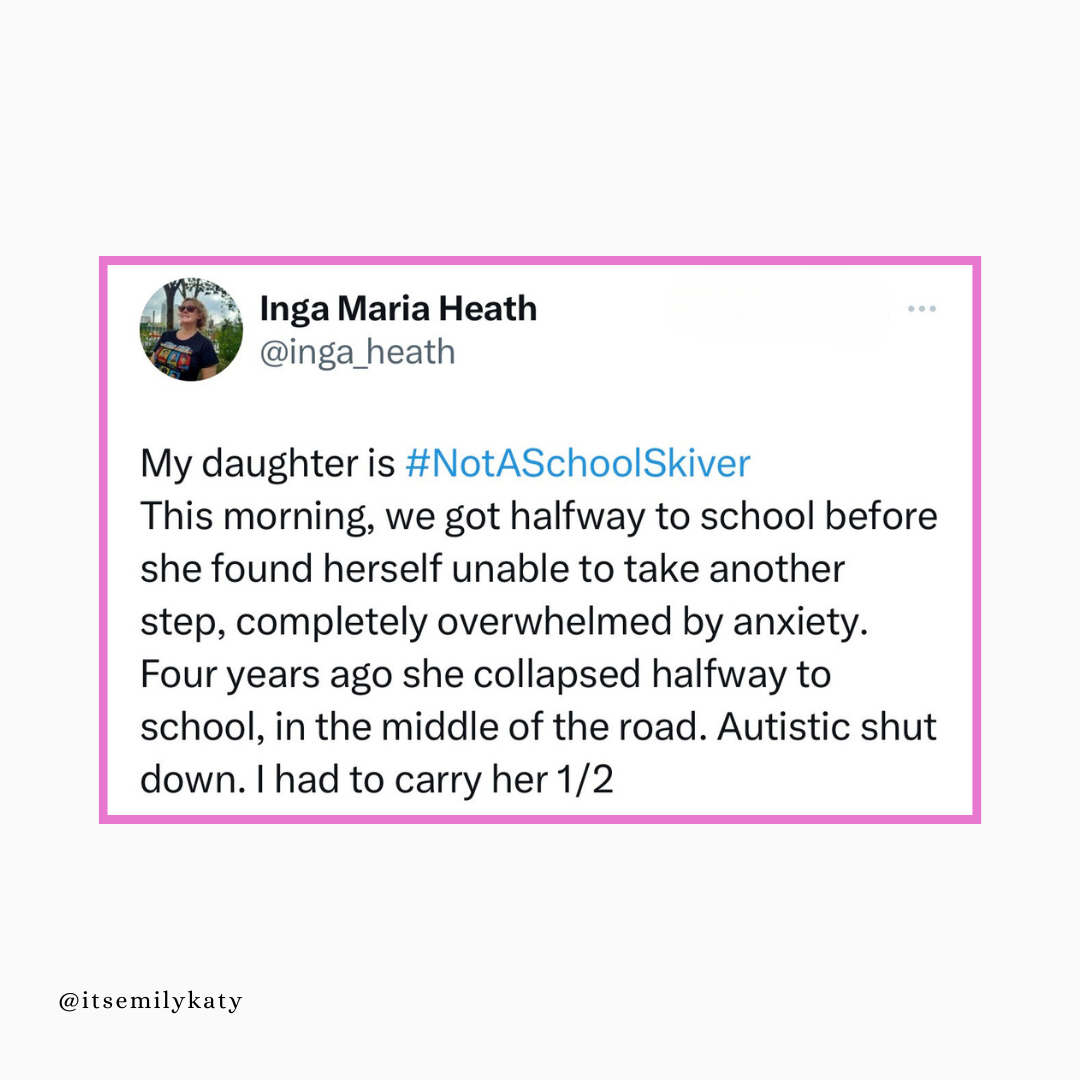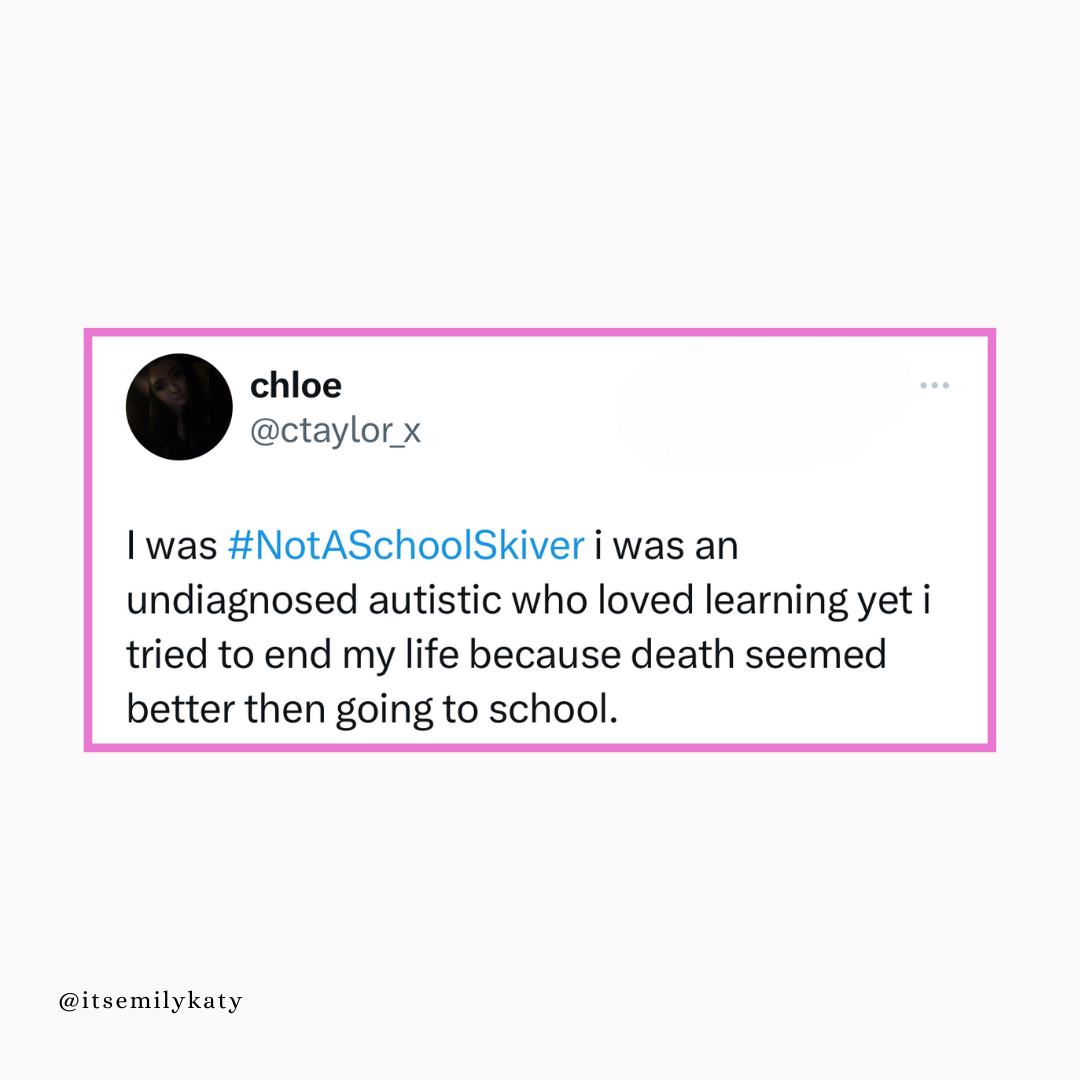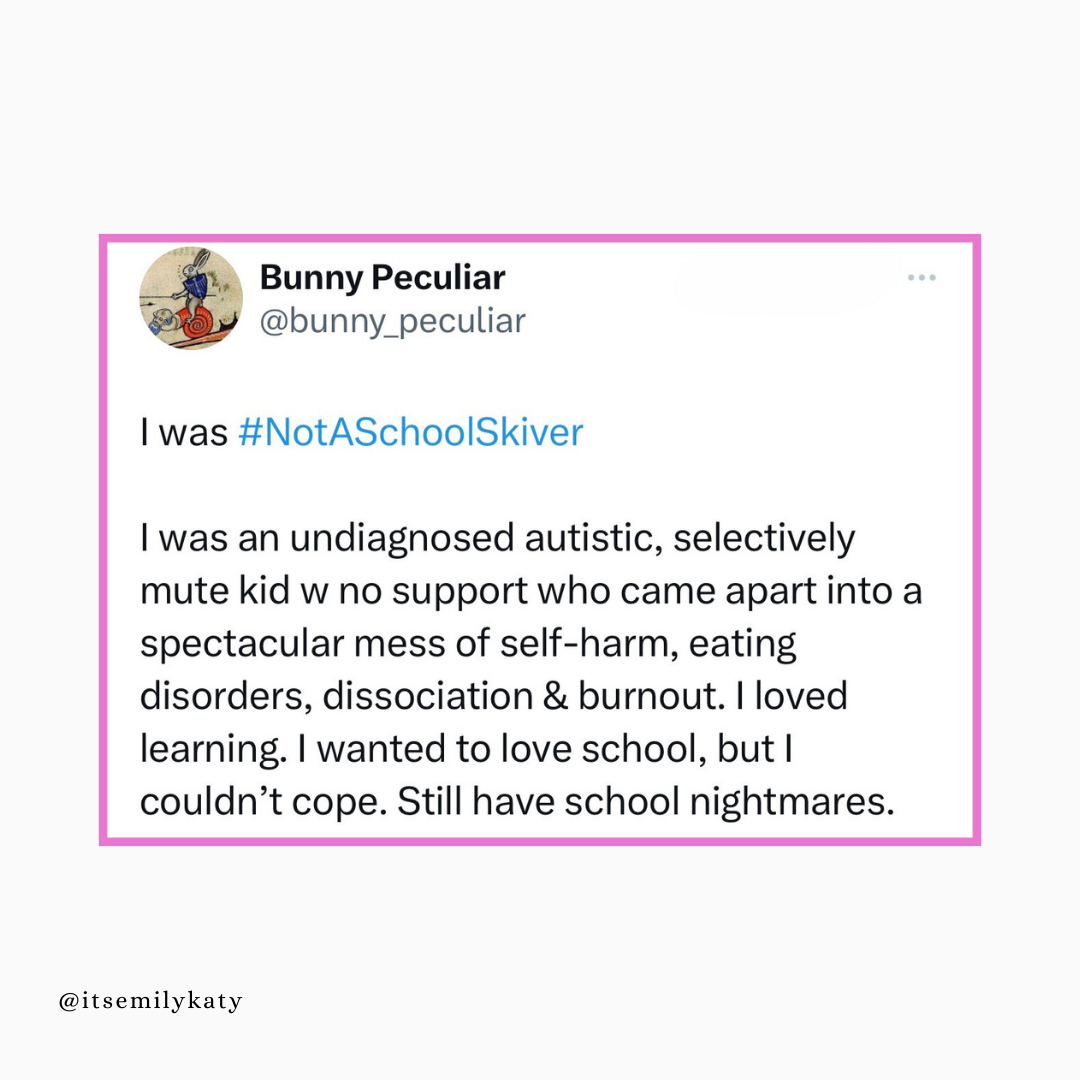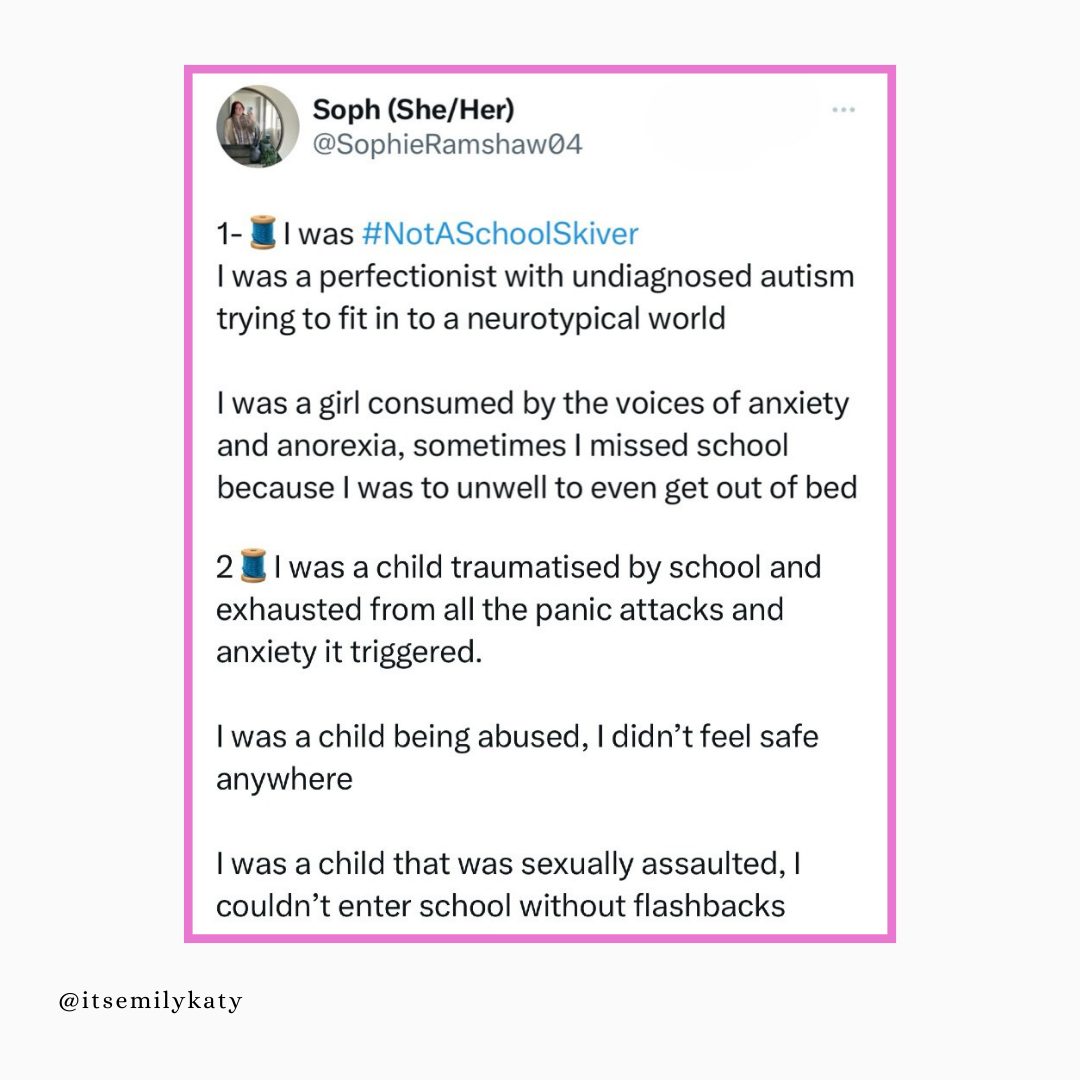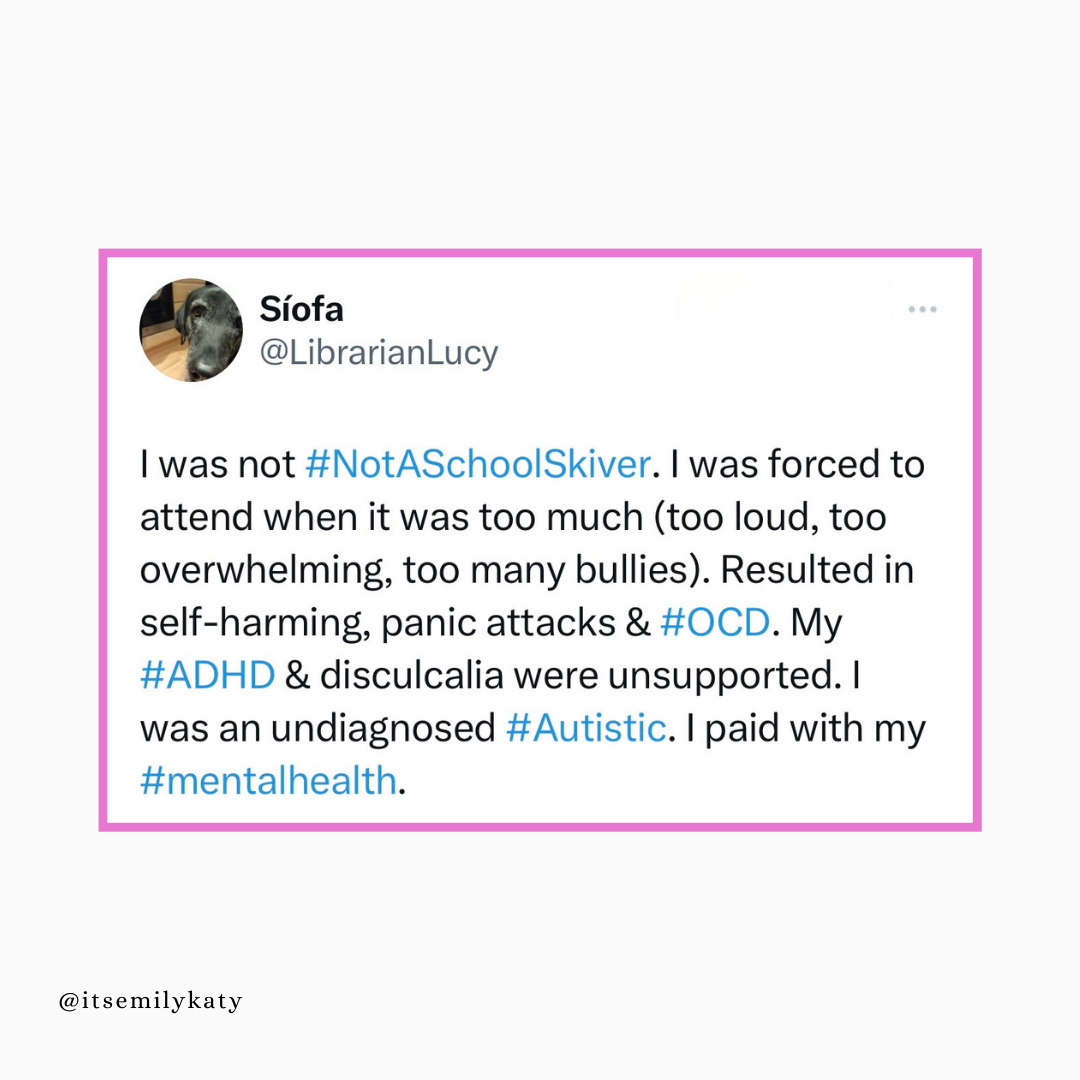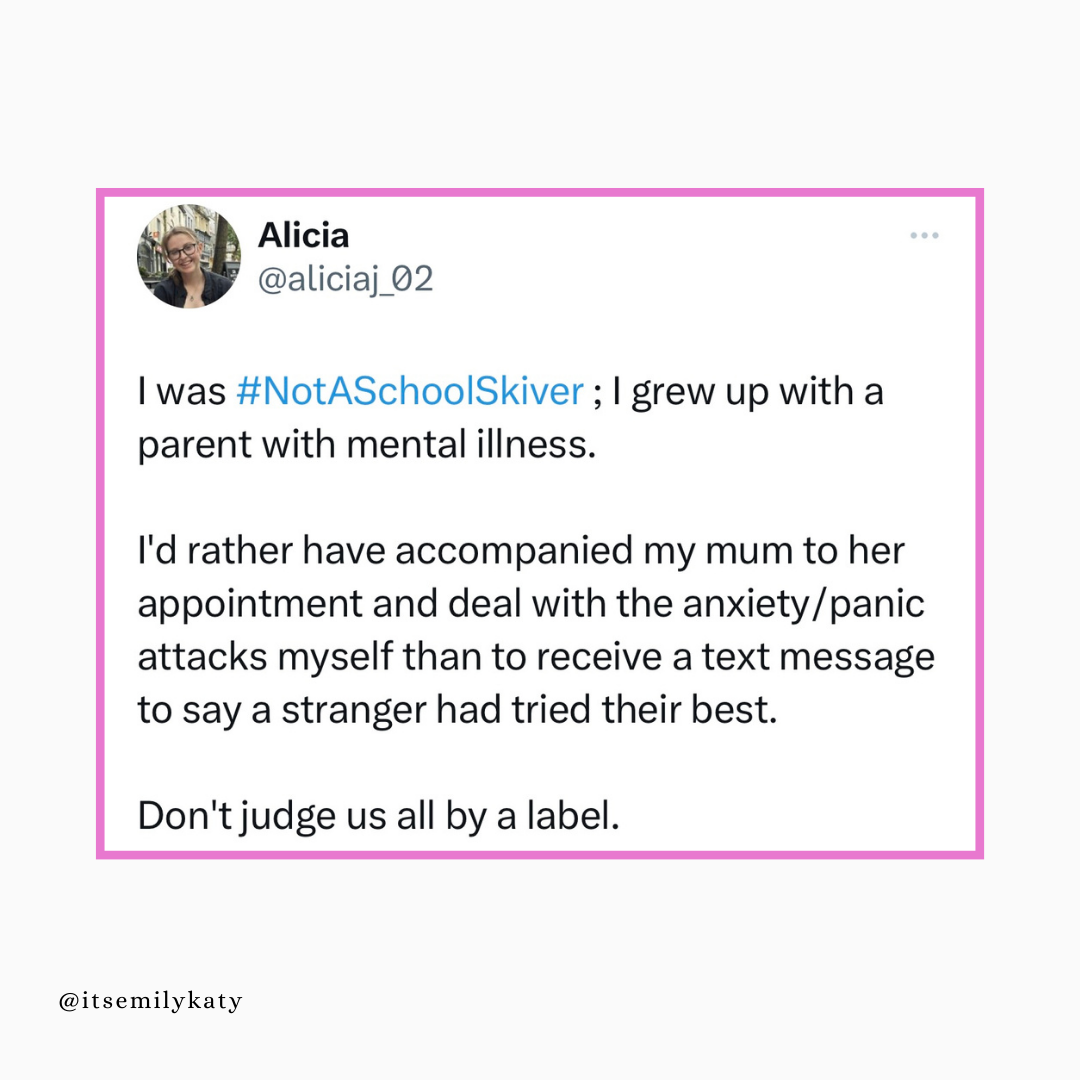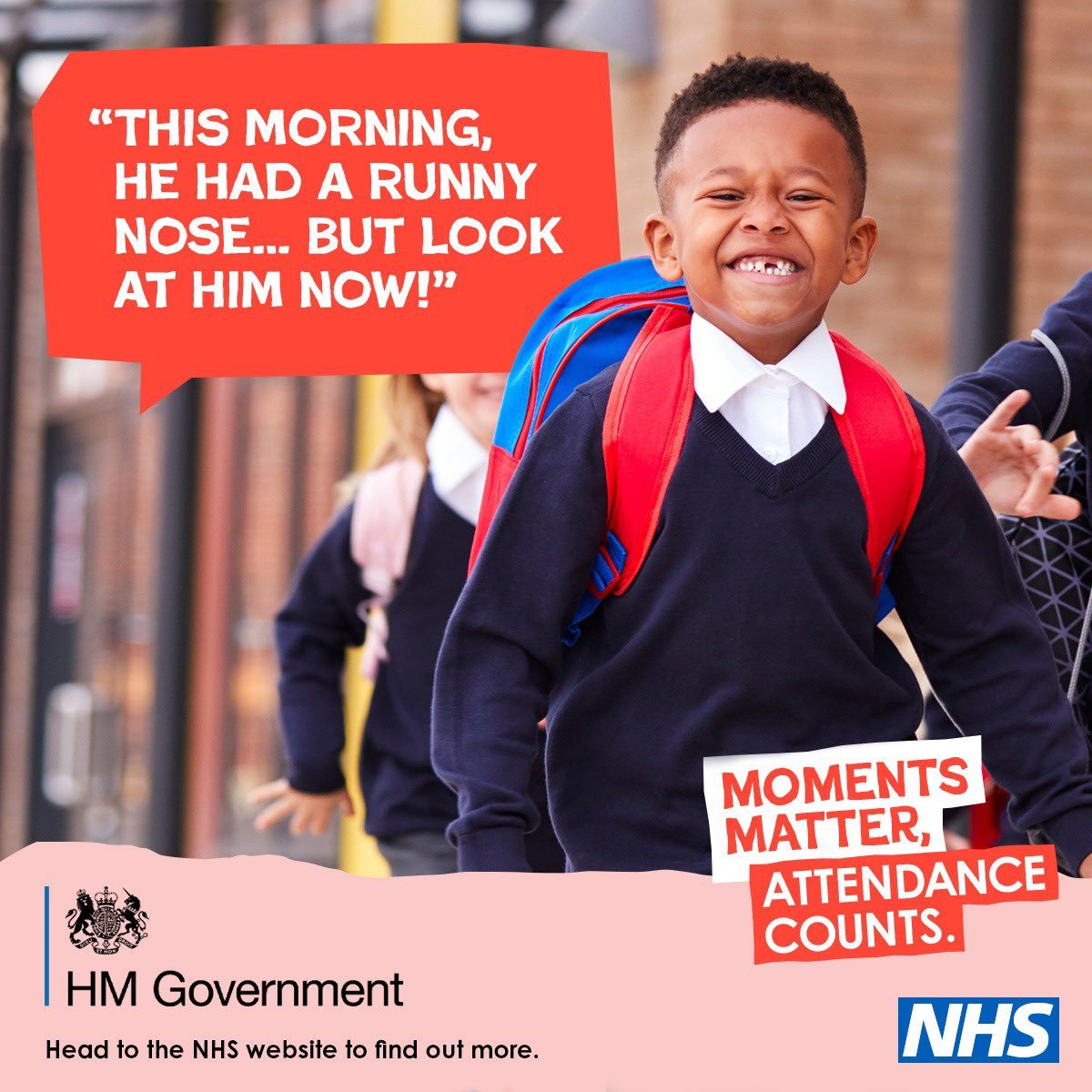The Truth Behind the ‘Attendance Crisis’ and Stories From Those Who Have Been There. #NotASchoolSkiver
On the 8th of January, the UK government launched its attendance campaign ‘Moments Matter, Attendance Counts’. The same day, Good Morning Britain hosted a news segment titled ‘School Skivers: whose fault - teachers or parents?’. In response, I wrote‘I Was Not a “School Skiver’ (which I would recommend reading first!) which I shared on Twitter and Instagram with the hashtag #NotASchoolSkiver.
Since then, hundreds of people have shared their stories using #NotASchoolSkiver, showcasing the truth behind the so-called ‘attendance crisis’. Of unsupported neurodivergence, of being a young carer, of menstruation being a barrier and period poverty, of mental health difficulties, of managing physical health conditions, of experiencing bullying, of being subject to trauma and abuse. None of them were skiving.
There is something going wrong, somewhere, that is not the fault of the child or family. We want the government to listen to us. So here are our stories - thank you to everyone who kindly allowed me to share theirs - showing what the TRUTH is behind the ‘attendance crisis’.
A system failing neurodivergent young people:
94.3% of school attendance difficulties is underpinned by severe distress, with 92.1% of those experiencing this distress being neurodivergent and 83.4% are autistic. So, as Connolly et al. (2023) state: “While not a story of exclusivity relating solely to autism, School Distress is a story dominated by complex neurodivergence and a seemingly systemic failure to meet the needs of these CYP. Given the disproportionate number of disabled CYP impacted, we ask whether the United Kingdom is upholding its responsibility to ensure the “right to an education” for all CYP (Human Rights Act 1998).” Considering that 98% of parents win SEND tribunals (meaning that only 2% of refusals by councils to provide SEND support requested were upheld in tribunal decisions), this does not appear to be the case, and unlawful decisions are being made by local authorities. Furthermore, this is costing taxpayers £60 million a year, the wait leads to deterioration in mental and physical health for children and their families, and leads to persistent absence from school. Children are being deprived of their right to an education.
Our school system isn’t working for neurodivergent children and young people, and the government isn’t upholding its legal responsibilities to ensure equal access to education for all.
“I was #NotASchoolSkiver. I was an undiagnosed female-presenting autistic whose traits weren’t recognised because they didn’t fit the white male-centric diagnostic criteria. Some days I was so anxious about school that I made myself sick by drinking salt water.”
“I was #NotASchoolSkiver, I was a kid with undiagnosed neurodivergence, trauma, severe anxiety and suicidal ideation. School was overwhelming, there was abuse and neglect at home and I had very little help through all of it. I’m lucky to be where I am now & most of it is because of me”
“My daughter is #NotASchoolSkiver. This morning, we got halfway to school before she found herself unable to take another step, completely overwhelmed by anxiety. Four years ago she collapsed halfway to school, in the middle of the road. Autistic shut down. I had to carry her”
“I was #NotASchoolSkiver i was an undiagnosed autistic who loved learning yet i tried to end my life because death seemed better then going to school.”
“I was #NotASchoolSkiver. I was a child struggling to cope with the grief of loosing a friend at 12. I was dyslexic with the only support being “use a dictionary”. I had undiagnosed ADHD, I wasn’t lazy and unorganised. This messaging is damaging. #DoBetter”
“My son hated school, caught in that trap of not being able to have a special school place and not being supported enough despite an EHCP in mainstream. Took him out and now in specialist FE thriving, its taken years to recover from it all. #NotASchoolSkiver”
“So, I was #NotASchoolSkiver. I was an undiagnosed neurodivergent child who was being abused and cried, no, begged for help. Me and my family were grossly let down by a broken system that unfortunately has not improved from my own school days. We needed help, not persecution”
“I was #NotASchoolSkiver. I was an undiagnosed autistic, selectively mute kid w no support who came apart into a spectacular mess of self-harm, eating disorders, dissociation & burnout. I loved learning. I wanted to love school, but I couldn’t cope. Still have school nightmares.”
“I was #NotASchoolSkiver I was an undiagnosed Autistic at the time, I had no support or understanding. I developed severe mental health difficulties and started self harming, developed Anorexia and fell into depression. It all had a big impact on my physical health. #autistic”
“I was #NotASchoolSkiver. I was a perfectionist with undiagnosed autism trying to fit in to a neurotypical world. I was a girl consumed by the voices of anxiety and anorexia, sometimes I missed school because I was to unwell to even get out of bed. I was a child traumatised by school and exhausted from all the panic attacks and anxiety it triggered. I was a child being abused, I didn’t feel safe anywhere. I was a child that was sexually assaulted, I couldn’t enter school without flashbacks”
“I was #NotASchoolSkiver. I was forced to attend when it was too much (too loud, too overwhelming, too many bullies). Resulted in self-harming, panic attacks & #OCD. My #ADHD & disculcalia were unsupported. I was an undiagnosed #Autistic. I paid with my #mentalhealth.”
“I was #NotASchoolSkiver. I would cry at night about school due to the fear of not getting accommodations for my tics. I was late to primary school almost every day due to having hours of OCD rituals in the mornings and having only 3 hours of sleep.”
2. Demand on Young Carers:
Demand on young carers has increased since COVID. 11% of young carers report an increase of more than 30 hours of caring time per week. 40% of young carers have worse mental health and 66% are more stressed since COVID.
There are over 800,000 young carers in the UK. Without the right support, Carers Trust state they “are at risk of lower exam results, and spending less time in education.”
Perhaps young carers are not getting the support they need. They need to be identified and recognised and supported to manage their caring roles.
“I was #NotASchoolSkiver; I grew up with a parent with mental illness. I’d rather have accompanied my mum to her appointment and deal with the anxiety/panic attacks myself than to receive a text message to say a stranger had tried their best. Don’t judge us all by a label.”
“#NotASchoolSkiver I was a child with a terminally ill parent. I was an adultified child who had on and off caring duties. I was a young person battling depression and anxiety with very little-to-no support and a very poor support network.”
“#NotASchoolSkiver I was a child who provided personal care to a family member. I still am a carer with on and off caring responsibilities. As a child, I was voted the ‘kid who was late the most to school’ and was given the ‘late award’ at awards evening. I had no support.”
3. Period Poverty and Menstruation:
“Periods and the issues surrounding them continue to be the biggest cause of school absence - and threat to academic achievement - for girls and young people who menstruate in the UK in 2023” - phs Group. Girls and those who menstruate miss more school because of their period than ANY OTHER REASON. This isn’t something I have heard the government mention.
phs Group’s research found that 54% of young people with periods miss school due to their period, on average missing 3 days a term. The reasons why include cramps (82%), having no period products available to them (8%) with 5% not being able to afford them (an increase of 3% compared to pre-COVID) and 36% having been stopped from using the toilet in class. 1 in 9 pupils have missed school because they could not afford period products.
Perhaps schools need to provide more free menstrual supplies in easily accessible locations, allow unrestricted toilet access (instead of locking the toilets during lessons as many schools now do) and have open conversations with young people about conditions such as endometriosis and PCOS.
“I was #NotASchoolSkiver. I suffered with awful period pain that would often leave me sick, lightheaded, and bed bound. School teachers and doctors dismissed this as “just bad periods”. I now suspect that I have endometriosis. Attendance matters but kids need to be listened to.”
“i was #NotASchoolSkiver. i had to choose between the bus fare to school and period products too many times.”
“I was #NotASchoolSkiver. I was a teenage girl who’s periods were so painful and heavy that I would bleed into my seat & cry with pain that made me nauseous & see double, whilst my teacher told me that it was can’t be that bad. I now know I have adenomyosis, endometriosis, & PCOS”
4. Mental Health difficulties:
NHS digital reported that the proportion of children aged 7-16 years old with a probable mental health (MH) condition rose from 12.1% in 2016 to 18% in 2022. In those aged 17-19, it rose from 10.1% in 2017 to 25.7% in 2022. This is a significant increase.
Financial difficulty has influenced this. 14.8% of 17-22 year-olds with a probable MH condition reported financially struggling to buy food or having to use a food bank compared to 2.1% of those without a MH condition, and 13.6% lived in a home which could not afford to keep the house warm compared to 6% of those without a MH condition. One in five (19.9%) of 7-16 year-olds experienced a drop in household income in the past year, yet this was more than one in four (28.6%) of those with a probable MH condition.
The same report also showed that children and young people with mental health problems were less likely to feel safe at school (61.2% versus 89.2%), more likely to have been bullied online (29.4% versus 12.6%) and more likely to feel lonely (18% versus 5.2% of those aged 11-16, and 28.9% versus 12.6% of those aged 17 to 22).
The increase in mental health difficulties has increased the demand on children’s mental health services, with an 84% increase in referrals in 2021-2022 compared to in 2018-2019. The introduction of mental health support teams in schools and colleges has been well-needed, but these currently only cover 35% of pupils, with the aim to increase this to 50% by April 2025. Yet at the same time, there has been a £1.1bn cut in youth services funding over the past ten years.
School absence rates are higher amongst those with mental health conditions - 12.6% missed more than 15 days of school compared to only 4% of those without a mental health condition.
Perhaps the government need to increase funding for children and young people’s mental health services and youth services, tackle poverty and inequality, and focus on what is actually impacting children and young people’s mental health.
“I was #NotASchoolSkiver. I was a recently traumatised teenager, struggling with major depression, PTSD, suicidality and self harm. I had flashbacks of my SA constantly yet school piled the pressure on with attaining academic results. I was dismissed and left to cry daily.”
“i was #NotASchoolSkiver. i hated school so much that i ate my lunch in the toilets. i had such severe anxiety that i had my first breakdown at the age of 14. i had to take entire days off school each week to go to therapy, as the closest CAMHS was on the other side of the city”
“I had almost 100% attendance up until Year 12, I then completely burnt out. I was self harming daily and my friendships at school had broken down. When I was at school I’d spend majority of the time hiding in the toilets. I was too unwell to cope with school. #NotASchoolSkiver”
“I was undiagnosed with autism, Tourette’s, Irlen and schizoaffective. So was severely struggling with no support. I had severe anxiety and depression. Was self harming several times a day and suicidal. Plus was bullied physically and emotionally everyday. #NotASchoolSkiver”
“I had experienced a lot of trauma, was bulimic, self harming daily, and severely suicidal. On top of that I was being bullied and laughed at and I could barely get through a lesson without wanting to die. I could barely face school. I was poorly #NotASchoolSkiver”
5. Physical Health challenges
Young people have to manage full-time school alongside a variety of life challenges. 1.7 million children and young people in England have a long-term condition such as asthma, diabetes and epilepsy. In January 2023, an estimated 69,000 children had Long COVID, leading to frequent fatigue, headaches and a range of symptoms.
In May 2023, more than 400,000 children in England were waiting for a hospital appointment, the highest number ever recorded. Paediatric services waiting lists increased by 39% between 2021 and 2023. The Royal College of Paediatrics and Child Health (RCPCH) Officer for Health Services stated “It’s clear now that the voices of children are not being heard…the health of our children is simply not a priority.”
Perhaps the government’s efforts would be better focused on this.
“I was trying to manage my GCSEs while processing resurfaced childhood trauma, coping with the fact my dad had cancer, managing undiagnosed Crohn’s Disease & Hidradeni Suppurativa, and more. I was #NotASchoolSkiver”
“I was #NotASchoolSkiver, I had developmental hip dysplasia and undiagnosed hypermobility. I missed loads of school through pain, hospital appointments, and often just a complete inability to weight-bear. If I were at school now I’d be humiliated and excluded from fun stuff.”
“I had expanded intestines & it nearly killed me - gastro digestive issues & couldn’t poop for weeks at a time as it wasn’t safe at school (bullying) and restricted access. I missed school every week due to this & would hide in toilets in agony wishing to be in class #NotASchoolSkiver”
“I was #NotASchoolSkiver. I was a disabled ND child with medical appointments, being bullied at school, beaten at home. Then I was living with a single parent who was disintegrating who then removed me totally from education. I got left to figure it out. But I was never skiving. Despite that I got back in education eventually graduated, retrained as a therapist & started a MA last year. NOT easy. Drowning in student debt. But I was #NotASchoolSkiver I was a vulnerable child with a vulnerable parent managing multiple diagnosed or not medical conditions.”
6. Bullying:
Statistics show that bullying is still a huge problem in UK schools. 2023 research by the anti-bullying charity The Diana Award found that 65% of children felt scared of going back to school because they have been bullied and HALF of parents worried about sending their children back to school due to bullying. One in TWO children experience bullying. Half of the children polled stated the thought of returning to school makes them feel anxious, with 33% saying it makes them want to cry. 89% of parents believe schools can be an unsafe environment for children.
Where are these stories reflected in the government’s discussions about school attendance? Has Rachel De Souza (Children’s Commissioner) who states ‘I have made school attendance one of my top priorities because children tell me how much they value their education and want to be in school’ actually spoken to these children?
Perhaps the government should be doing something to tackle bullying instead.
“My daughter was #NotASchoolSkiver. She was bullied throughout school. She never understood why, or why working her hardest was never enough. After self-harm, an eating disorder, and hospital admissions, she was finally diagnosed as autistic. She’s just one of so many.”
“It is absolutely appalling to see this harmful message being spread by the government, I was #NotASchoolSkiver I was bullied from the age of 7, I lost family members throughout school, I was pushed into a pattern of learning and exams that did not suit me. Just not good enough.”
“#NotASchoolSkiver I was bullied relentlessly at school and abused at home. Nobody took the time to ask what was going on and I was deemed the difficult kid. I used to hide in the toilets and self harmed when things got too much. That was 25 years ago. Not much has changed.”
“i was #NotASchoolSkiver i was exhausted from the constant panic attacks, anxiety and couldn’t function in the environment. I would last no longer than an hour in school some days before being sent home due to the severity of the panic attacks caused. i was bullied by students and a member of staff which meant i didnt feel comfortable at school and isolated myself to one room for the entire time. i was physically and mentally unwell from the pressures of school life yet my attendance was “the problem””
7. Trauma/Abuse:
1 in 3 children and young people experience at least one traumatic event before they turn 18. Half a million children suffer abuse in the UK each year. Between 2008/2009 and 2018/2019, the number of child protection enquires increased 139% and there has been the biggest increase in the number of children entering care each day.
Unfortunately, during that time, there were significant funding cuts from the government, but a significant increase in spending by local authorities. Early intervention services have declined by 46% in the last 12 years, with spending directed towards high-cost late-intervention such as children in care.
“Local authorities are unlikely to be able to break this cycle if they are unable to afford to service growing demand...The opportunity to deliver a system which enables a greater number of children to stay with their families, more young people to grow up in stable and loving homes, and fewer children experiencing abuse, neglect, harm, or exploitation, means the stakes for delivering this change could not be higher.” - The Children’s Society.
Perhaps the government should invest more in children’s social care, and in mental health services to help young people navigate trauma.
“I was #NotASchoolSkiver; I was abused. at home by a parent who also had an alcohol addiction. Sometimes I missed school because I had to stay up all night making sure they didn’t set the house on fire again when they were too drunk to keep themselves or us safe. Sometimes I missed school because I was physically locked in my bedroom. Sometimes I was late because I had no one to help me sort my uniform, sometimes I had to walk over an hour to get to school because one of my parents was still drunk and unable to drive. You don’t always know what’s going on in a child’s life.”
“#NotASchoolSkiver I am a survivor of child abuse & domestic violence. I was hospitalised due to neglect. I was moved across the country 6 times. I had to attend family court. This was only a small fraction. YET no one asked WHY I was missing school.”
“I was living in a domestic violence household, was scared of leaving mum at home. And living with anxiety and being bullied horrendously at school #NotASchoolSkiver”
“I was in care & adopted. Punished as a truant, difficulty, naughty, disruptive kid but bullied by tens of kids across three year groups. I had anxiety, was suicidal. My parents were unsupportive. I dropped out at 14 and went back into care. Turns out i’m AuDHD+. #NotASchoolSkiver”
You don’t always know what is going on in a child’s life. We want the government to listen to what is actually behind the attendance crisis. The reasons outlined above. Instead of sharing posters like these, which are, quite frankly, ignorant and insulting.
And let’s put it in perspective, please. Tim Linehan stated on Twitter that “Primary school absences are only 1% above pre-pandemic levels” due to having fallen, and only “severe absence, an indicator of school distress, (when you miss over 50% of school) is up”. This is based on data from FFL Education Datalab. And when we remember that it is predominantly neurodivergent pupils who are persistently absent, with the largest number of SEND tribunals in a year recorded in 2023, it is clear that the education system is not working for these children, and they are not receiving the education and support they are legally entitled to.
There is no evidence that fining or prosecuting non-attendance is effective in getting children back in to school. But there IS evidence showing the harm it causes. The British Psychological Society (2017) state that fines and prosecution is usually unlikely to have any effect on persistent absentees.
Thank you to everyone who have very kindly provided consent for me to share their quotes and stories. Reading everyone’s stories is heart-breaking, sad, and angering, but also make me feel hopeful and reassured. None of us who have been there or the children who are there now are alone.
Essential Resources:
Not Fine in School - parent led organisation empowering families and raising awareness of attendance barriers.
Square Peg - fighting for ‘an education system that doesn’t expect square pegs to fit into round holes’.
Steph’s Two Girls blog series ‘Not Fine in School’ - sharing real experiences.
‘Can’t Not Won’t: a story about a child who couldn’t go to school’ by Eliza Fricker, and her website.
Dr Naomi Fisher - social media, books and webinars on the education system.
Sunshine Support - school attendance difficulties and school-related trauma.
Pre-order GIRL UNMASKED now from Amazon and all major bookstores! https://linktr.ee/girlunmasked
References
Anna Freud. (undated). UK trauma council. https://www.annafreud.org/get-involved/networks/uk-trauma-council/#:~:text=One%20in%20three%20children%20and,relationships%20and%20new%20stressful%20experiences.
Carers Trust. (2020). My future, my feelings, my family: how Coronavirus is affecting young carers and young adult carers, and what they want you to do next. https://carers.org/downloads/what-we-do-section/my-future-my-feelings-my-family.pdf
Connolly, S., Constable, H. & Mullally, S. (2023). School distress and the school attendance crisis: a story dominated by neurodivergence and unmet need. Frontiers in Psychiatry, 14. https://doi.org/10.3389/fpsyt.2023.1237052
Contact a Family. (2023). New figures show nearly all parents in England forced to go to SEND tribunal win. https://contact.org.uk/about-contact/news-and-views/new-figures-show-nearly-all-parents-in-england-forced-to-go-to-send-tribunal-win/
Contact a Family. (2023). Councils in England waste £60 million on court disputes about support for children with special educational needs. https://contact.org.uk/about-contact/news-and-views/councils-in-england-waste-60-million-on-court-disputes-about-support-for-children-with-special-educational-needs/
Department for Education. (2023). Transforming children and young people’s mental health implementation programme: data release. https://assets.publishing.service.gov.uk/media/646248cf427e41000cb437ab/Transforming_CYPMH_implementation_programme__data_release_May_2023.pdf
Department for Education. (2024). Major national drive to improve school attendance: press release. https://www.gov.uk/government/news/major-national-drive-to-improve-school-attendance
Epstein, R., Brown, G. & O’Flynn, S. (2019). Prosecuting parents for truancy: who pays the price? Coventry University. http://covrj.uk/prosecuting-parents/
FFL Education Datalab. (2024). Pupil absence in autumn term 2023. https://ffteducationdatalab.org.uk/2024/01/pupil-absence-in-autumn-term-2023/
Hamilton, S. (2023). Half of UK children experience bullying at school - here’s how to help. https://www.hellomagazine.com/healthandbeauty/mother-and-baby/502354/how-to-help-children-being-bullied-at-school/
Keer, M. (2023). SEND tribunal 2023: when will councils stop wasting public funds defending SEND appeals when they fail almost all the time? Special Needs Jungle. https://www.specialneedsjungle.com/send-tribunal-2023-councils-stop-wasting-public-funds-send-appeals-fail-almost-all-time/#:~:text=Families%20registered%2013%2C658%20appeals%20with,the%20SEND%20reforms%20were%20introduced.
Local Government Association. (2023). Children and young people’s emotional wellbeing and mental health - facts and figures. https://www.local.gov.uk/about/campaigns/bright-futures/bright-futures-camhs/child-and-adolescent-mental-health-and
Local Government Association. (Undated). Children’s services funding - facts and figures. https://www.local.gov.uk/about/campaigns/bright-futures/bright-futures-childrens-services/childrens-services-funding-facts#:~:text=and%20funding%20has%20been%20cut,100%20million%20more%20by%202020.
Lynch, P. (2023). Over 400,000 children waiting for hospital appointments. Medscape. https://www.medscape.co.uk/viewarticle/over-400-000-children-waiting-hospital-appointments-2023a10009yl
Ministry of Justice. (2023). Tribunal statistics quarterly: July to September 2023. https://www.gov.uk/government/statistics/tribunals-statistics-quarterly-july-to-september-2023/tribunal-statistics-quarterly-july-to-september-2023#annual-special-educational-needs-and-disability-send-statistics
National Institute for Health and Care Excellence (NICE). (undated). Managing long-term conditions in the community. https://www.nice.org.uk/about/what-we-do/into-practice/measuring-the-use-of-nice-guidance/impact-of-our-guidance/niceimpact-children-and-young-peoples-healthcare/ch2-managing-long-term-conditions-in-children
National Society for the Prevention of Cruelty to Children (NSPCC). (2022). Half a million children suffer abuse in the UK every year. https://www.nspcc.org.uk/about-us/news-opinion/2022/childhood-day/
NHS Digital. (2022). Mental health of children and young people in England 2022 - wave 3 follow up to the 2017 survey. https://digital.nhs.uk/data-and-information/publications/statistical/mental-health-of-children-and-young-people-in-england/2022-follow-up-to-the-2017-survey
NHS Digital. (2022). Rate of mental disorders among 17 to 19 year olds increased in 2022, new report shows: statistical press release. https://digital.nhs.uk/news/2022/rate-of-mental-disorders-among-17-to-19-year-olds-increased-in-2022-new-report-shows
Not Fine in School. (undated). Attendance. https://notfineinschool.co.uk/attendance
phs Group. (2023). Period equality: breaking the cycle. https://www.phs.co.uk/media/4037/phs-period-equality-breaking-the-cycle-whitepaper-2023.pdf
phs Group. (undated). Period equality. https://www.phs.co.uk/equality/period-poverty/
Pro Bono Economics. (2023). Wasting money, wasting potential: the cost of SEND tribunals. https://www.probonoeconomics.com/wasting-money-wasting-potential-the-cost-of-send-tribunals
Scott, E. (2023). Mental health support for children and young people. House of Lords Library. https://lordslibrary.parliament.uk/mental-health-support-for-children-and-young-people/#fn-20
The Children’s Society. (2023). The well-worn path: children’s services spending 2010-11 to 2021-22. https://www.childrenssociety.org.uk/information/professionals/resources/the-well-worn-path
The Children’s Society. (2024). What do we know about being a young carer? https://www.childrenssociety.org.uk/what-we-do/our-work/supporting-young-carers/facts-about-young-carers
The Diana Award. (2023). New research reveals majority of children fear going back to school. https://diana-award.org.uk/news/new-research-reveals-majority-of-children-fear-going-back-to-school
The University of Manchester. (2023). Supporting a child with long COVID - tips from parents of children living with the condition. https://www.manchester.ac.uk/discover/news/supporting-a-child-with-long-covid--tips-from-parents-of-children-living-with-the-condition/#:~:text=The%20latest%20figures%20from%20the,for%20at%20least%20a%20year.
YMCA. (2022). Devalued: a decade of cuts to youth services. A report examining local authority expenditure on youth services in England & Wales. https://www.ymca.org.uk/wp-content/uploads/2022/02/ymca-devalued-2022.pdf
